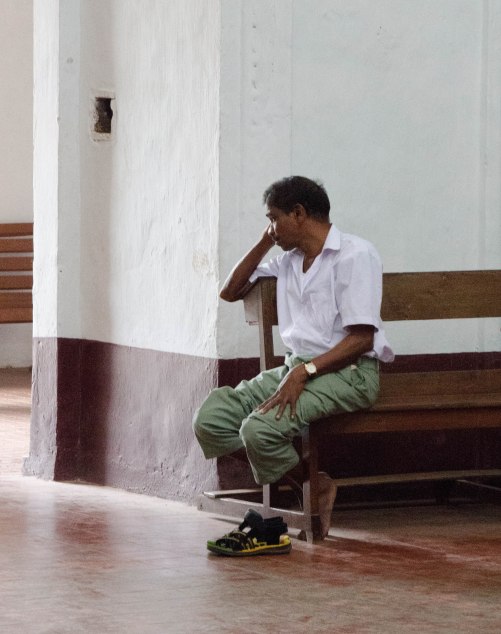“It manifested itself first in the form of breaking down every night and crying. After that, I had about an eight month gap where it seemed to be just loneliness and culture shock. Then it came back in the form of laziness and anger if someone disturbed me from my book or video game. Later came sadness, and confusion. Now I just feel numb. Like I can’t cry or even really care anymore. Just apathetic. The defining feature of my depression is that I barely touch my food”. – ‘Artemis’
“I just feel constantly tired…and grumpy and don’t really enjoy doing anything and feeling lonely even though the family (hubby, kids) are around” – anon.
Lazy….angry…..despondent….tearful…..apathetic….trapped…..
All of the above words were used to describe to me how expats felt when they were going through a bout of depression. Last week I started to look at some real life examples to break down when and why expats are affected; this week I want to focus on how the illness typically manifests itself. Hopefully this will help you recognise the condition not only in yourself, but in others around you – including your partner. By doing so, I hope you can start to find the help you (or they) need.
Like last week, I found the answers given to me from a survey I used to gather stories and experiences for this series had many commonalities. The same words and terms, the same sense of desperation, came up over and over. So, as before, I have broken the results down into the most common themes – but caution that there will be plenty of other typical signs and symptoms that I can’t cover here. So if in doubt, always seek a professional opinion.
As always, I am sending this blog post to expat mental health specialist Anita Colombara to read before it is published. I am not a medical professional so prefer to have someone with specific expertise in this field to check what I am putting out there.
Listlessness, laziness, lack of energy

Probably the most common theme of all was one of apathy – of not wanting to get up, do anything, go anywhere. People talked about how they just didn’t want to get out of bed in the morning. Some described being “constantly tired”, others just “deflated”. One person told me they felt like they were on a treadmill, and didn’t have the energy to do anything other than the “necessary stuff just to get by”. Another said she actually experienced “chronic fatigue”. And another said she “felt overwhelmed by daily tasks”.
Spurning social interaction
This sort of listlessness is a very common symptom of depression, but when you are an expat recently arrived in a new location the feeling can be overwhelming. Getting out there and meeting people is part and parcel of this new life; for many, it’s just one step too far. Your mind may just tell you a far easier option would be to stay in bed or on the sofa, you may just find yourself switching off.
One anonymous respondent to my survey described
“dreading social activities, not wanting to talk to people, not leaving the apartment…”
Another respondent, Nicky, said she
“found it incredibly hard to start building new relationships. I preferred to stay home and watch TV or talk to friends back home, and I started to feel more and more isolated.”
And another, simply calling themselves PKF, told me:
“First, it started with low motivation to get out of bed in the morning. Since I don’t have an exact hour to start working, I would get up later and later every day. I also started to feel less willing to meet new people, to engage in new relationships, or even to do things that before used to bring me a sense of pleasure”.
Lack of joy, anxiety, anger, crying.
“My husband worked long hours and I felt angry with him that he had more “freedom” than me” – Nicky.
“I yelled at my kids, snapped at my husband, and cried all the time. I was working like a maniac, running miles every week, and I couldn’t keep the demons at bay” – A trailing spouse.
One step up from a general feeling of deflation, people told me of very negative feelings they started to have – often aimed at their partner, or at their host country (which I will explore further in a post that links culture shock and depression). I know from my research for the Expat Partner’s Survival Guide (as well as personal experience!) this can be particularly true for the non-working partner in a relationship. It’s hard not to feel some bitterness when your spouse’s life carries on almost as before while yours is turned completely upside down.
Crying a lot, or just feeling tearful, was another symptom that came up many times – another sign of depression that is often unrecognised until someone looks back and realises they aren’t doing it anymore. Others reported having anxiety attacks, especially when they did get out of the house – with one respondent to the survey saying she found it particularly difficult to be anywhere where she didn’t know anyone, or around “hustle and noise, anywhere I feel my senses are being bombarded”.
Lack of interest in things that should bring you joy
“I was constantly tired and unable to do much of anything after coming home from work. I just wanted to lie down. Not even cook, although I was hungry. I knew it was depression when I was spending time with my best friends and not happy with them anymore. The stress was too much and overpowering the joy that usually comes from spending time with friends”. Anon
More specific than just a general apathy some people said they had a very definite lack of interest in things that would normally bring them pleasure. Included in this was their children, food, social activities, and sex. Some also said they couldn’t enjoy their time with their partner, had no interest in them or couldn’t think of anything to talk about with them.
Difficulty sleeping, or sleeping too much
Some felt too anxious to sleep, others were fatigued all the time. Some just found their usual sleep routines were disrupted. “Expat girl” said:
“I was sad all the time. My sleeping routine was completely shifted, I didn’t sleep at night but in the morning it was always extremely difficult to stand up from the bed to go to university. I could not listen to happy music and preferred to be in the dark lying on the floor”.
Not looking after themselves
“I stop taking care of myself and find it quite a chore to shower or to make myself look presentable” – Robyn.
Survey respondents also reported feelings of worthlessness that led to them not looking after themselves. This included both physically – not bothering to get dressed in the morning, not eating properly – and also mentally, eg not caring about their own feelings.
Food issues
Some people said they went off their food, but more commonly people reported over-eating. Food is often associated with comfort so it’s no surprise that this is often what people turned to when they were down.
Eating too much of the wrong food can have a negative effect on your emotions at the best of time so it is inevitable that this is not going to help your mood. And when it turns into unwanted weight gain, you are probably going to feel even unhappier about yourself and less likely to want to get out there and meet people. It may be one of the less serious effects of depression but comfort eating really can become a downward spiral.
Alcohol
Sadly another bi-product of this sort of depression can be turning to alcohol. Particularly prevalent in expat communities anyway, where social life is often exaggerated compared to back home and alcohol can be cheaper, turning to drink is often first thought of as a way to cope with negative feelings. Unfortunately the short-term fix often leads to a longer-term problem – I have known several people develop an often unrecognised or diagnosed alcohol problem while living overseas.
As with all my posts I welcome all comments and contributions as this is a topic that is far wider than just these blog posts. In my next blog on this topic I want to move on to look in more detail at culture shock and whether people felt it contributed to their depression or even if they understood when culture shock ended and depression began. After that, I will begin to look at how people have helped themselves when they have been depressed and later how they have sought professional help.
(Photo credits: Man on bench – ashokboghani; Man in water – mgstanton ; doughnut – 5th Luna)
Please don’t forget to read my other posts in this series: Introduction to expat depression, what is expat depression, when and why does it happen and the link between culture shock and expat depression



This is exactly how I feel, everyday! Have been hospitalised twice since I have been here, am on meds have a cpn and a psychiatrist. I have never been so lonely!
LikeLiked by 1 person
Oh no where are you based? I wish I could help more, are you a member of any expat groups or forums? I really can recommend the I Am A a Triangle group, lots of very understanding expats who will know what you are going through. I’m so sorry.
LikeLike
I think it can be harder to recognise depression when you are abroad because the feelings described here probably will affect you at some point anyway as an expat, and many people will dismiss these feelings as normal. I am thankful that o didn’t suffer from depression, but definitely had my difficult days and somehow these are a lot harder when you’re in a new place. Thankfully in Brunei there were plenty of other people in the same situation and his made it a lot easier.
LikeLiked by 1 person
Thanks Liz! By the way did you see how many hits and shares I got on the post that shared your last post before leaving Brunei? I think our thoughts on expat friendship certainly resonated with a lot of people 🙂
LikeLiked by 1 person
PS How are you getting on with repatriation?
LikeLike
Well thank you, I think my expat posting gave me some vital skills in settling in to a place as it has been much easier this time round than when I first moved to Aberdeen. I really need to write more blog posts, but sadly I’m catching every cold virus going as my immune system is out of practice!
LikeLiked by 1 person
Glad to hear it! I found settling in here a lot easier than any of my other postings. I do believe pre warned is pre armed!
LikeLiked by 1 person
Hi Clara,
I’ve been enjoying your series and saw this article today that you might find interesting–homesickness was once a medical condition! http://nymag.com/scienceofus/2016/02/homesickness-was-once-considered-a-medical-diagnosis.html
In some ways it’s pretty strange, but in others, maybe doctors back in the day had a firmer grasp on the medical nature of depression than we think!
LikeLiked by 1 person
This is so true. I’ve been in the US for 18 months now and I still dread social interaction and struggle with homesickness. This series is really helpful, thanks for posting.
LikeLiked by 1 person
Thank you for commenting. That sounds tough, 18 months is a long time. Please keep reading as I will have some info on what others have done but do seek professional help if you think you might need it.
LikeLiked by 1 person
If you had written this as a checklist, I’d have ticked every single one! Thankfully, it goes in cycles now and I can sense a ‘low’ coming, and do things to stave it off or mitigate its effects. Thanks for writing about this, Clara!
LikeLiked by 1 person
Thank you for your comment. I was researching my next post last night, about how people have helped themselves. Even though I haven’t really had depression as such I still definitely have low periods and realised that there were things we can do. Recognising what you are going through is a great place to start. Only then can you start to fight it. I’m so glad you have been able to do this 🙂
LikeLiked by 1 person
Thank you Clara for this post and everyone who’ve shared their experience with depression. You all are so brave and strong.
LikeLiked by 1 person
Thank you Anita, as always 🙂
LikeLike
Unbelievable how living away from home can deeply affect our mental health! I have had and still have some days all of the “symptoms” listed above (except for the increase in alcohol consumption!). It’s an everyday battle and it is exhausting. I have never had so many illnesses and visited so many doctors/specialists and had so many tests/exams/blood work! Being an expat has made me sick. Literally. I know that my mental health has affected my physical health. I’m still hoping to survive and to cope for the sake of my daughter.
Thank you Clara for this; it’s truly helpful.
LikeLiked by 1 person
And thank you for your comment Jana. I really hope you do survive – in my next post I start to discuss some of things people found helpful to do for themselves, followed by one about seeking professional help. But sometimes just understanding and ackowledging is enough. And knowing that you are not alone x
LikeLike
Pingback: A series on expat depression: round-up |
I just made a comment on another post in this series…after reading through this one, things are starting to click. Much of what has been said in the post and in comments are resonating with me. Perhaps this is what has been wrong and why I haven’t been feeling like myself.
Now I need to figure out how to manage it.
LikeLiked by 1 person
Thank you for commenting, I am glad this series has helped. The first step very often is acknowledgement, then you are in a much better place to do something about it, whether that be seeking professional help or self-help methods. I hope you find the help you need – there are lots of online counsellors now if that is the road you decide to go down. X
LikeLiked by 1 person
Pingback: The Hardest Part About International Relocation For A Job - Fluency Corp